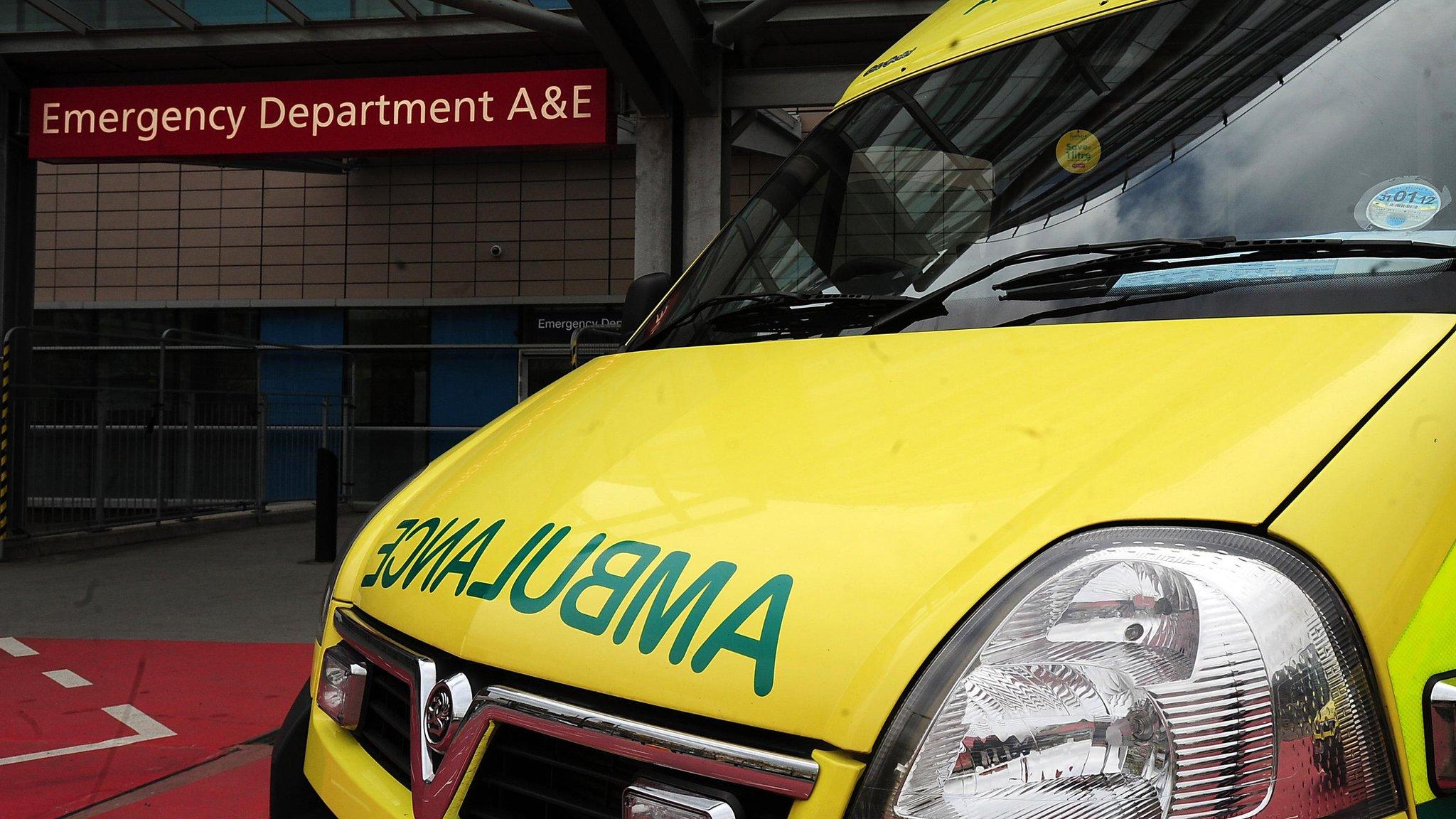Ambulances 'face long delays at A&E' - BBC figures reveal
- Published
Long handover delays stop crews responding to other urgent calls, as Branwen Jeffreys reports
Some patients taken by ambulance to A&E departments are waiting in the vehicle for much longer than the recommended 15 minutes, with one case involving a six-hour delay, figures show.
Data for ambulance services in England, Scotland and Wales, obtained by the BBC under the Freedom of Information Act, suggest Wales had the longest waits.
Another ambulance in eastern England waited for more than five hours.
NHS England said waiting times were improving.
The Welsh government said the figures were unacceptable but that most people were waiting for an average of 20 minutes.
Paramedics can only hand patients over to hospitals when staff there are ready to take charge of them.
This process is supposed to take no longer than 15 minutes and delays of more than 30 minutes can lead to fines for hospitals in England.
Longest waits
The BBC asked all UK ambulance services for their longest waits for each of the 12 weeks from early August to the end of October.
No service saw its longest wait dip under an hour, with many around the two-hour mark, the figures revealed.
The longest waits were seen in Wales, where one ambulance was left queuing for six hours 22 minutes.
Each weekly maximum wait in Wales for the period was above three hours.
In England, one service in the east had the longest single wait at five hours 51 minutes, although the average is around the 15-minute mark.
Scotland had the best record in the UK with none of the weekly maximums exceeding two hours.

Get involved on:
Northern Ireland and the Isle of Wight failed to provide data.
Dr Clifford Mann, president of the College of Emergency Medicine, described the figures as "alarming".
"There's always going to be a small number of patients whose transfer is delayed, but not to the extent of these figures - which are approaching three, four - sometimes six hours," he said.
"And remember, these figures relate to the three months up till October. They don't include the really pressured time of the winter and so it's unlikely these figures are going to improve - and that must be a cause for concern."
'Exception to the rule'
A Welsh government spokesman said: "Lengthy patient handover delays are clearly unacceptable."
But he added the long delays were the "exception to the rule" as the average waiting times were around the 20-minute mark.
Barbara Hakin, of NHS England, said: "It is essential ambulances are back on the road as soon as possible after taking patients to A&E."
But she said that while there were pressures on the system, the number of delays that were over 30 minutes was currently running at almost 4,500 a week - down on last year's figure.
Barbara Hakin, NHS England: It is "sometimes in the best interest of patients' safety that they remain in the ambulance"
Roger Goss from campaign group, Patient Concern, said: "I appreciate that hospitals have all these targets - and you need targets to incentivise people - but if you aren't meeting them, you have to find out why and do something about it."
Feeling the strain
The findings have been revealed amid mounting pressure on the NHS as winter gets under way.
To help keep track of what is happening, the BBC has launched a special NHS winter project., external
It includes access to weekly information on how each major A&E in England is coping, as well as a dedicated Facebook page, external.
The latest data suggests the health service is already beginning to feel the strain. While the four-hour A&E waiting time target is being met nationally, there are many individual hospitals falling short.
More than half of the major A&E units - known as type 1 - are already in breach of it.
The number of non-emergency operations being cancelled and the delays being seen in discharging patients are also higher than they were this time last year.
- Published13 March 2015

- Published6 December 2013

- Published6 December 2013